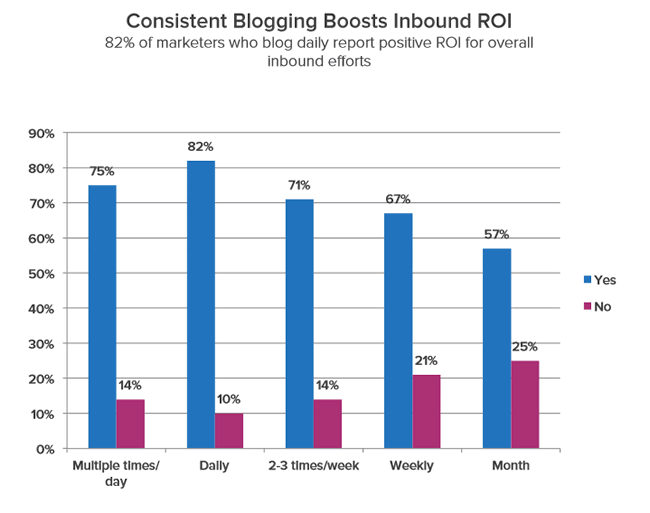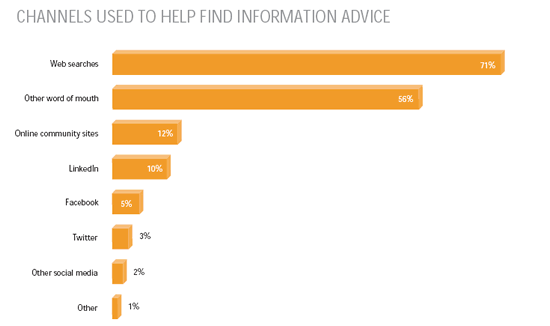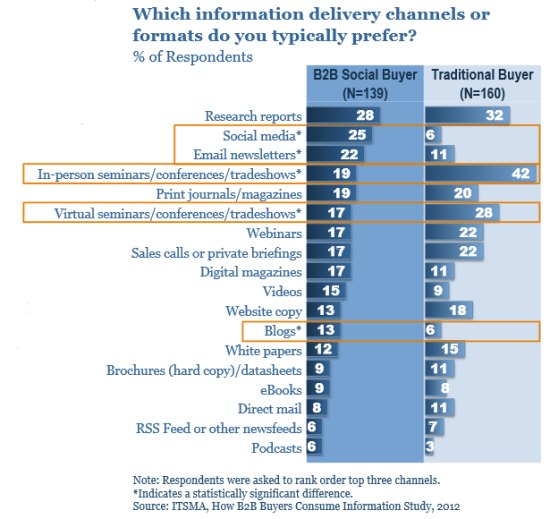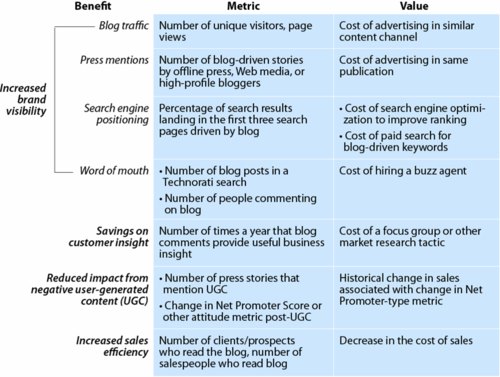 Several businesses don’t have a corporate blog yet. Is it a must? It depends. But in general corporate blogs remain essential, despite the fact some ‘experts’ claim that blogging is ‘passé’. Corporate blogs often are essential social media hubs and content marketing hubs as explained in our introduction to corporate blogging. However, the value of corporate blogging goes beyond tactics and channels.
Several businesses don’t have a corporate blog yet. Is it a must? It depends. But in general corporate blogs remain essential, despite the fact some ‘experts’ claim that blogging is ‘passé’. Corporate blogs often are essential social media hubs and content marketing hubs as explained in our introduction to corporate blogging. However, the value of corporate blogging goes beyond tactics and channels.
While the corporate website or specific microsites are often the places where prospective customers come in later stages of the buying journey and where they check “you” out and look for specific information, corporate blogs play an essential role in many other stages. They also have other goals as you can read below.
Although I will sum up some of the inherent benefits of corporate blogs in this – rather exhaustive – post keep in mind that it’s always about the buying personas, target audiences and people you want to reach and/or engage. This obviously is in tune with the proposition of your brand and many potential business goals. ‘Reaching’ increasingly equals being found. Ask any SEO expert what the role of content is to achieve that nowadays.
Corporate blogs: engage, inspire, involve and inform
Customer engagement is about actions in a connected context. Ultimately, it’s about action and that’s how it gets measured too. Furthemore, corporate blogs simply play a role in customer acquisition as such and have an impact on the ROI of inbound marketing.

Many businesses are blogging about themselves without taking into account the broader context.
It’s traditional PR in a new package: corporate blogs as a way to shout how great they are. But that shouldn’t surprise us. Just check how often website copy and content is made from the corporate viewpoint instead of the journey of the visitor. But that’s for an other post.
Just like any other form/format/channel of content marketing, corporate blogs are about personas and target audiences. And most of all about ‘solving’ the problems they have. The essentials of storytelling, remember?
Does this mean that corporate blogs can never be about your products or solutions in a direct way? No, it doesn’t. There are exceptions and remember that your business can have several blogs, if the purpose requires its. You can, for instance, create a blog for existing customers where you help them use your solutions in a better way. Although, in this case you’ll probably use community platforms with a strong blog component. There are ample examples of such blog- and content-driven platforms covering products and solutions. But they too are built upon the premise that they solve questions and provide answers to questions of the community.
Corporate blogs in the strict sense are not about your solutions, even if it’s OK to provide call-to-actions within the context of your blog content.
The place and role of corporate blogs in the social landscape
Since the advent of social media, corporate blogs are more than ever used as social media hubs. In some cases social networks can also be social media hubs and even the corporate website offers various – underused – possibilities regarding social media marketing.
But corporate blogs are definitely used as the main social media hubs. They are the source of social interactions and facilitate dialogues.
However, it’s about business first and foremost. And, if we look at how buyers search information (or increasingly find it), the role of corporate blogs becomes even more obvious. Content and corporate blogs are not a goal but a means to an end. Today, more than ever before, buyers, journalists, prospects and other professionals increasingly seek relevant content. They have more channels to do so and with the advent of social media, they can share and find it in many ways.
Prospective B2B buyers predominantly look for information in search engines to discover content as The European Buyersphere survey 2012 shows. The quest for information is part of the buyer journey and buyers consult multiple content sources. So, blogging is about lead generation by providing the right content at the right time too, as is all B2B content marketing.
In some regions, blogs and content are even more important in the buying journey. The same goes for specific industries. Also note that younger generations of decision makers are much more connected and social savvy. They rely more on blogs and social channels and recommendations. However, web searches, leading to answers to questions buyers have are crucial and blogs play an important role here.

Relevance: connecting what people seek and what you create (and share) with your corporate blog
Blogging is a perfect way to create content and make it found by the people we want to reach. How? By creating the content they are looking for! For who are you creating a specific blog post? Why would they care? What’s the goal you have in mind. These are all questions to ponder.
Blogs allows us to share stories, attract and convince in entirely new ways. Most importantly, it offers a very personal way of engaging people who look for answers, solutions or education. Blogs are essential in all content-related marketing activities and in most social media programs. Bloggers and their readers or connections with other bloggers, however, are key to success.
The main reason why corporate blogs matter: your prospective customers consult them. Make sure your blog is relevant, responds to questions, solves conflict and is trustworthy and utterly customer-centric.
Blogging is also about looking at what other people write about and building relationships with them. Even B2B buyers themselves create lots of content in the form of comments or blogs. That’s a huge source of information and insights. Besides blogging as an activity, blog marketing includes building relationships with other bloggers and reaching out to communities of other bloggers.
Finally, don’t forget that in B2B a buying decision is often a group process and that – as mentioned – the buying behavior depends a lot on parameter such as industry, region or demographics. If we compare the behavior of the so-called B2B Social Buyer (connected, social-savvy and somewhat comparable to the ‘connected consumer’), we notice a huge difference with the more ‘traditional B2B buyer’.
As an example, take a look at the information delivery channels or formats buyers prefer in the ICT industry (based on a report by the ITSMA). You’ll notice that social media and blogs are much more used by the ‘B2B Social Buyer’. Then ask yourself who is tomorrow’s decision maker but most of all who are the people that have a voice in the decision process in B2B that is typically a group buying process, involving multiple stakeholders and thus internal influencers. Your goal is not only to engage the person that signs the deal but everyone that plays a role before that happens.

Corporate blogs are the lifeblood of sites and social interaction
Corporate blogs are strongly integrated with other channels and your blog activities will benefit from these channels. Blogs are also the perfect complement of the different online marketing and business tactics we use and in which the corporate website plays a pivotal role.
Although corporate blogs can fulfill several other goals, their value in driving people to our website and company is critical. By funneling social interactions back to the blog, you bring the conversations, visitors and interactions to your social hub, where you have most ‘control’ (I know, it’s an awkward word), resources and opportunities to identify, convert and engage people.
It’s also where people can register, showing their interest in what you say and do. Corporate blogs are great ‘social’ places to send people to your site and move from a blog contact to a website visitor, identified contact and ultimately business relationship. The model below explains how that works in general. By using blogs you can become part of the inner circle of trusted advisors of people. If you can achieve that, just imagine the consequences…
So, blogs are the lifeblood of the website and drivers of social interaction and interesting contacts. Furthermore, there is a direct correlation between the costs of leads (potential customers) and the use of blogs.
Essential benefits of corporate blogs
Websites are perceived as purely commercial, informational and transactional by most Internet users. Their goal is to help visitors find the information they need in order to buy, get in touch with you, find customer service etc.
Their goal is also to enable people to transact, interact and act in a direct relationship with your business. So, they are directly business-related. While this is important and one of the reasons why corporate blogs should provide entry points to your website, a blog focuses more on conversation, advice, insights, education, ‘leadership’, generation of ‘demand’ and stories.
This less commercial and more informal (personal and relational) approach is a benefit since it allows you to operate more in tune with the ways people find information and buy. Corporate blogs are built to spark people’s interest and once attention is captured, take it to the next level. A more informational and narrative approach provides the human interaction modern buyers increasingly seek. They allow you to improve trust and credibility.
Corporate blogs and the possibility of getting up more close and personal
As opposed to websites, blog entries are linked to authors, human beings providing a face to an otherwise faceless organization. This personal dimension also adds to credibility, interaction, relationship-building and a sense of community and familiarity.
This dimension of personality does not end in the blog posts and author bios themselves. Responding and reaching out to other bloggers and/or actively participating outside of the own blog are important as well. These activities provide a fast route to building a personal network, reputation and community of readers, depending on the value and tone of voice of contributions.
Corporate blogs allow more types of information
A website contains the features, benefits and advantages of products and services the prospective customer is looking for.
Blogs don’t. However, corporate blogs allow you to zoom in on topics or specific advantages in a way that’s in tune with your goals and what your readers seek in a personal way. You can write about virtually everything that serves your goals and those of readers, while defining how specific, strategic, practical, narrative, informational or in-depth you want to go.
Being found (and making sure you’re found) by offering what people look for at the right place
Corporate blogs allow you to create much more content than websites do, based upon a clear content strategy and content marketing strategy, whereby content gaps are filled in and the journey comes first.
Each blog post and page is an entry point to the blog, website and business. Furthermore, corporate blogs enable you to put out content much faster than is the case with websites. Volume and speed, in combination with technical features and the frequency of blog updates, determine how well your content is found using search engine optimization. Search engines, the main source of traffic and interesting visitors, take all these factors into account. Along with the relevance of the blog posts and the social interactions around them they determine the placement of blog posts in natural search result pages.
Search engines just love good blogs. The consequence? You have more chances to be found with blogs, build more entry points and develop more relationships. Oh, and you’re not that dependent from IT anymore.
Obviously you also need to make sure that your content is available (and thus served) at the right places. It’s about more than search engines and it’s not that people will come if you ‘build’ alone.
Corporate blogs and community
Blogs allow you to create stronger emotional bonds and be less factual. A deeper emotional engagement is essential in establishing trust, credibility and loyalty.
But it’s also important to identify and row communities. These communities can form around shared interests. So, if you blog about particular topics, communities will crystallize and they have expectations. Reader expectations are created at the beginning of the publishing process, which corporate blogging really is. When they are met after the launch and you keep sharing your passions, even stronger communities are the result. Also participate in communities of others.
Sharing and subscriptions
Blogs thrive on social sharing and interaction. They are designed for it. Furthermore, blogs offer multiple subscription possibilities to enter in a more frequent, personal and better targeted dialogue with visitors.
Registering for one of these services is a sign of interest as such. Among the sharing mechanisms are RSS feeds and integration with third party interaction tools such as download platforms or email tools. Don’t just think inbound by the way. The difference between inbound and outbound is artficial to start with. Moreover, not all blogs have thriving communities and they don’t need to either. Connecting with the right audiences by striking a targeted balance of inbound, outbound, promotion etc. is key, always offering the options your readers prefer and of course always testing and optimizing.
The blogosphere
Blogs link to websites and other blogs all the time. In fact, linking to other websites is a blogging best practice as you will discover further.
The connectedness of blogs is one of the pillars at the basis of blogs. As a blogger, you connect with others as well. This offers new opportunities to network. In a network economy, the strength of a network is an asset. By linking, commenting, guest posting, reaching out to other bloggers and forming communities an ecosystem of blogs and bloggers was formed: the blogosphere. Tapping into it is the foundation of influence and reach that is unmatched by any other form of marketing.
A potential feedback machine
Getting comments and feedback allows you to pursue several business goals and solicit input or feedback on virtually anything you would like to know. Blogs can be used as never-ending feedback and monitoring systems, ideally in an integrated way with other tools.
The possibilities of feedback and input can be optimally used by writing blog posts with the explicit goal of getting it, creating polls, conducting surveys and participating in communities and other blogs.
Note that most people will never comment or provide feedback directly. However, you can monitor virtually everything that happens with your blog content across multiple channels, including of course the blog itself. Also note that commenting habits are changing and many people use comment sections to promote their own stuff. If it’s relevant that’s fine but with the SEO obsession often it’s not.

More benefits of corporate blogs
Below is a list of some key blog benefits.
- Dialogue over monologue. Blogs have their roots in dialogues and are built to encourage them. People are less appreciative of monologues in marketing.
- Blogs are company-owned media and allow you to be a media outlet yourself.
- While social media come and go, blogs are the only social platform that remains since it is not controlled by a third party.
- Sometimes we make mistakes. Blog posts are ideal ways to talk about them in an open and ‘human’ way.
- The return of blogging is high. It’s a cost-effective form of communication. The real cost once the blog is built is composed of the resources dedicated to maintenance, scheduling, writing, spreading and following up.
- You have a permanent social presence.
- If content matches what people seek and is relevant, search engines love blogs.
- Highly integrated environments.
- They are analytics and optimization champions.
- Human and relational branding power.
- Leadership, credibility and trust.
- The sources of social sharing.
- Business entry points.
- Etc.
Addendum: understand the origins of blogging; on conversations
Blogs were initially used by individuals who created and shared content just because they could and because they wanted to connect with those who were interested in their content and shared common interests. Blogs enabled people to build their personal content-based home base in the online universe. It’s important to understand these roots of blogs since you will discover that many bloggers still do it for the same reasons.
The primary reason why businesses started embracing blogs is important as well. The main idea was the rediscovery that markets are conversations as explained in ‘The cluetrain Manifesto’. From that book you actually should remember just one sentence (it doesn’t take away the fact that I advise you to read it entirely, if you haven’t done it already): ‘markets are conversations’. The authors refer to the original role of ‘the market’: a place where people come together, display their goods, talk about the weather and meanwhile, with a chat and a handshake, buy and sell all sorts of goods. At first sight it is a simple and evident comparison. But, there does hide a very important marketing reality behind it. Understanding this is like immediately understanding what corporate blogging is really about. Markets are conversations. Unfortunately companies and marketers had forgotten a little about it and they didn’t converse anymore (and they didn’t listen at all). The decline of the conversation in the commercial process has been attributed to the mass production (and communication) model that has made its ascent since the industrial revolution.
It is a model that has alienated the companies and “consumers” from each other by a “we and they’ discourse. ‘We’ are the companies that manufacture products; ‘they’ are the ones who use them. And between them lies marketing: PR, commercials, communication, market research: everything companies need to have to get known and to reach the estranged “consumer”. Or, in other words: the direct ‘conversation’ had disappeared. Blogs were the first real way to put back the public in PR and the ‘other’ in communications. Furthermore, the conversations happening in the blogosphere proved beneficial if companies listened in to all these conversations and acted upon the lessons they learned. While other social media allow conversations too, the tone of voice is set on the blog as the primary tool to drive and channel conversations
Looking at blogs this way will make you a better blogger since it will make you focus on dialogues, community, connecting and sharing. More importantly, it offers you a chance to do more than simply watch the conversations that happen whether we like it or not.

